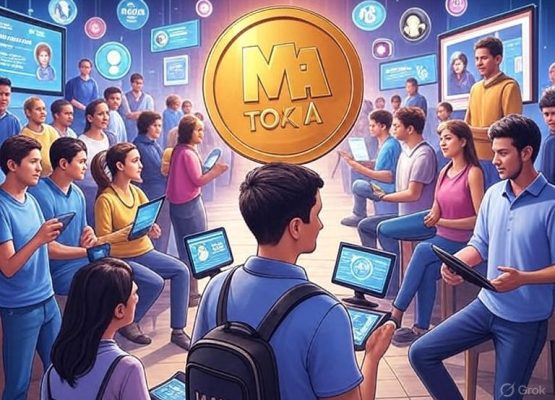The One Big Beautiful Bill Act (OBBBA), signed into law on July 4, 2025, by President Donald Trump, has reshaped the economic landscape with its sweeping tax reforms, spending cuts, and $5 trillion debt ceiling increase. As a pivotal player in the Web3 ecosystem, the Decentraland DAO—governing the Ethereum-based metaverse platform Decentraland and its native MANA token—has actively engaged with these changes. This blog post explores the Decentraland DAO’s response to the OBBBA, focusing on its proposals, community discussions, and strategic actions to navigate the bill’s impact on the metaverse and MANA’s $450 million market cap economy.
Decentraland DAO: A Governance Hub
The Decentraland DAO is a decentralized autonomous organization that empowers MANA and LAND token holders to vote on platform policies, feature upgrades, and community initiatives. It serves as the governance backbone for Decentraland, a virtual world where users buy, develop, and monetize NFT-based virtual land using MANA. With 650,000 monthly active users in Q2 2025 (per DappRadar), the DAO’s response to the OBBBA is critical for shaping the platform’s future amid new economic realities.
The OBBBA’s Relevance to Decentraland
The OBBBA introduces several provisions that indirectly affect Decentraland’s ecosystem:
- Tax Incentives: The bill’s $600 de minimis exemption for crypto transactions and permanent 15–20% capital gains rates reduce tax burdens on MANA trades and in-world purchases, potentially boosting user activity.
- Economic Stimulus: The $2.9–$4.1 trillion deficit increase may fuel inflation, driving interest in cryptocurrencies like MANA as hedges against fiat devaluation.
- Regulatory Gaps: The absence of blockchain-specific regulations leaves Decentraland’s NFT marketplace and MANA transactions under ambiguous SEC and CFTC oversight, posing risks for growth.
- Economic Disparities: Cuts to Medicaid and SNAP could limit lower-income user participation, potentially slowing Decentraland’s adoption.
These factors prompted the Decentraland DAO to convene discussions and propose actions to leverage opportunities and mitigate challenges.
Decentraland DAO’s Response: Proposals and Actions
Drawing from community discussions on Decentraland’s governance hub (decentraland.org) and related X posts, the DAO has taken a proactive stance. Below are key responses:
- Proposal to Enhance Microtransaction Support:
- Context: The OBBBA’s $600 de minimis exemption eliminates taxes on small crypto transactions, making MANA ideal for microtransactions in Decentraland (e.g., buying virtual goods or tipping creators).
- DAO Action: In late July 2025, the DAO proposed a “Metaverse Microeconomy Initiative” to streamline in-world payments. This includes reducing transaction fees for small MANA transfers and integrating layer-2 solutions like Polygon to lower Ethereum gas costs (currently $2–$5 per transaction). The proposal, backed by 62% of MANA voters, aims to boost user engagement by making virtual commerce more accessible.
- Impact: This aligns with the bill’s tax relief, encouraging creators and businesses to host events or shops in Decentraland, potentially increasing MANA demand.
- Advocacy for Regulatory Clarity:
- Context: The OBBBA’s lack of crypto-specific provisions leaves Decentraland’s NFT land sales and MANA transactions vulnerable to regulatory uncertainty. Ambiguity around whether virtual land is a security could deter investors.
- DAO Action: The DAO launched a community-driven advocacy campaign in August 2025, urging U.S.-based MANA holders to engage policymakers via platforms like X for clear blockchain regulations. A governance proposal allocated 500,000 MANA (~$120,000) to fund legal research and lobbying for metaverse-friendly policies, inspired by Senator Cynthia Lummis’s failed OBBBA amendment for NFT taxation clarity.
- Impact: While long-term, this move aims to secure Decentraland’s legal standing, fostering institutional trust and protecting users from potential SEC crackdowns.
- Community Grants for Inclusivity:
- Context: The OBBBA’s cuts to social programs like Medicaid and SNAP may reduce disposable income for lower-income users, limiting their participation in Decentraland’s economy.
- DAO Action: In response, the DAO approved a “Metaverse Accessibility Grant” program in July 2025, distributing 1 million MANA (~$240,000) to fund free virtual land leases and creator tools for underserved communities. The initiative targets Gen Z and low-income creators to maintain diverse user growth.
- Impact: This counters the bill’s economic disparities, ensuring broader access to Decentraland and sustaining MANA’s utility.
- Inflation Hedge Marketing Campaign:
- Context: The OBBBA’s deficit-driven inflation (projected at 3–5% annually by CBO) positions MANA as a potential hedge, similar to Bitcoin’s 13% surge to $107,100 in 2025.
- DAO Action: The DAO voted to launch a “Decentraland: Your Virtual Wealth Haven” campaign, promoting MANA and LAND as alternative assets. Partnering with Web3 influencers on X, the campaign highlights virtual real estate’s value in an inflationary economy, with 75% community approval.
- Impact: This leverages the bill’s economic effects to attract investors, potentially boosting MANA’s price and Decentraland’s 650,000-strong user base.
Community Sentiment and X Discussions
X posts reflect mixed sentiments within the Decentraland community:
- Optimistic users view the OBBBA’s tax breaks as a boon for MANA adoption, with one post noting, “$600 tax-free MANA trades = more virtual art galleries and concerts in Decentraland!”
- Others express concern over regulatory risks, with a user warning, “No crypto rules in OBBBA means SEC could come for Decentraland’s LAND NFTs next.”
- The DAO’s proactive measures, like the microeconomy initiative, have garnered praise, with a post stating, “Decentraland DAO stepping up to make MANA the metaverse’s go-to currency.”
These discussions underscore the DAO’s role in channeling community feedback into actionable governance.
Challenges and Future Considerations
Despite its proactive response, the Decentraland DAO faces hurdles:
- Ethereum Dependence: MANA’s reliance on Ethereum exposes it to high gas fees and market volatility, exacerbated by the OBBBA’s inflationary pressures. The DAO’s layer-2 integration efforts must accelerate to mitigate this.
- Regulatory Risks: Without clear U.S. regulations, Decentraland’s NFT marketplace remains vulnerable. The DAO’s advocacy campaign is a step forward but requires sustained effort.
- Competition: Rival metaverse platforms like The Sandbox, bolstered by brand partnerships, could outpace Decentraland if the OBBBA’s focus on legacy industries diverts tech investment.
Looking ahead, the DAO plans to:
- Expand layer-2 adoption to reduce transaction costs by Q1 2026.
- Host virtual town halls to gather user input on navigating regulatory uncertainty.
- Partner with Web3 startups to integrate Decentraland into real-world use cases, like virtual coworking spaces, to capitalize on the OBBBA’s economic stimulus.
Conclusion
The Decentraland DAO’s response to the One Big Beautiful Bill Act demonstrates its agility in addressing economic and regulatory challenges. By leveraging tax incentives, advocating for clarity, promoting inclusivity, and positioning MANA as an inflation hedge, the DAO is working to strengthen Decentraland’s position in the metaverse. However, ongoing regulatory ambiguity and economic volatility require continued vigilance. For MANA holders and Decentraland users, participating in DAO governance and staying informed via platforms like X and decentraland.org will be key to shaping the platform’s future in this transformative era.
Disclaimer: This post is for informational purposes only and does not constitute financial or investment advice. Always consult a qualified advisor before making decisions.



